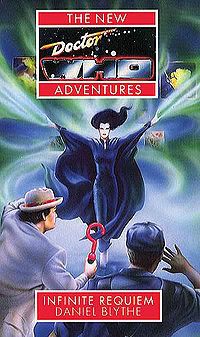 A novel featuring the Seventh Doctor and Benny
A novel featuring the Seventh Doctor and BennyWritten by Daniel Blythe
Polarity Rating: 2 out of 5
The humans are at war with the Phractons on the planet Gadrell Major, where the conflict has razed the planet's cities to the ground. In the meantime, three strange and powerful people are exploring three different places in the universe, and all three are actually one omnipotent, powerful creature. All of this results in the Seventh Doctor and Benny finding themselves on Gadrell Major, amidst the conflict taking place and up against Shanstra, whose powers are culminating even as the war around her is coming to a bloody end.
Infinite Requiem is very well-written by Daniel Blythe, who was unfamiliar to me up until reading this book. The problem is that it brings nothing new or interesting to the table. Admittedly, I have been slacking off a little on posting these reviews, and I put this story down about a month ago, read another book and finished it, and picked up a third book before I sat down to write this review. I find myself in a fog, because there's little, if anything, memorable about this story.
The televised stories are rife with conflict between one alien race and another, or one colonized civilization and its unruly rebels. Sometimes it works, sometimes the story just fades into the woodwork. (Tell me what you can remember about "Colony in Space," for instance.) Infinite Requiem is a lot like that. We have a war between the human beings and the Phractons, a cyborg race who are all connected via a virtual electronic grid and house themselves in small flying pods; I was reminded of the Toclafanes in the contemporary Who stories "The Sounds of Drums" and "Last of the Time Lords." I liked the Phractons, and desperately wanted to learn more about them, but the story doesn't exactly pull us in that direction.
The antagonist is an ethereal being which has split into three separate entities, calling themselves Kelzen, Jirenal, and Shanstra. We see a lot of Shanstra, and learn that she can bend minds to make people do things against their will and pretty much do the standard stuff that any god-like omnipotent creature can do: you know, fly about, shoot energy bolts from her hands, that type of thing. Jirenal, definitely the most interesting of the group, makes his way to the Pridka Dream Centre, which is run by a race of psychic reptilians called, of course, the Pridka. The Dream Centre is another place I wanted to learn more about, but we are only treated to snippets of storyline from there in the first half of the book, and although the action culminates there in the end, the novelty has worn off and the Doctor's attempt to defeat Shanstra and prevent her from accomplishing the titular "infinite requiem" takes center stage.
I said earlier that this book had little, if anything, to remember it by, and I just remembered something. There's a glorious scene where Jirenal makes a young Pridka's head peel back and burst open before a white dove comes flying out of the corpse. Not that's the kind of cool powers I wanted to see more of. Also, the Seventh Doctor is up to his usual manipulative tricks, which gets him punched in the face in the end.
This sounds like a hated the book, but I didn't. I suppose the word "meh" would best summarize my feelings for it. Doctor Who seems to be saturated with stories about wars and villains who think they're gods. Naturally, it's all squared away by the Doctor in the end, and of course it's done in typical deus ex machina style. I find myself reading, listening, or watching stories that involve characters or concepts that are simply too complex for me to wrap my little mind around, like the Eternals in "Enlightenment" or the infamous "Ghost Light." Infinite Requiem was no exception. Perhaps it's just me, and if other fans enjoy this stuff, then more power to them!
Daniel Blythe began his writing career with Doctor Who and later moved on to better things. I wish him the best. He's obviously talented and can weave a good tale. I just hope he never comes near Doctor Who again.
Fun Facts:
- Although the TARDIS' zero room was allegedly jettisoned in "Castrovalva," it reappears here.
- Captain Cheynor appeared first in The Dimension Riders, also penned by Daniel Blythe. Blythe must not have liked him very much, as he pathetically kills Cheynor in the final pages.
- There's a brief mention of the time-space visualizer seen in "The Chase." Apparently it's been recording all of the Doctor's adventures since its installment.
